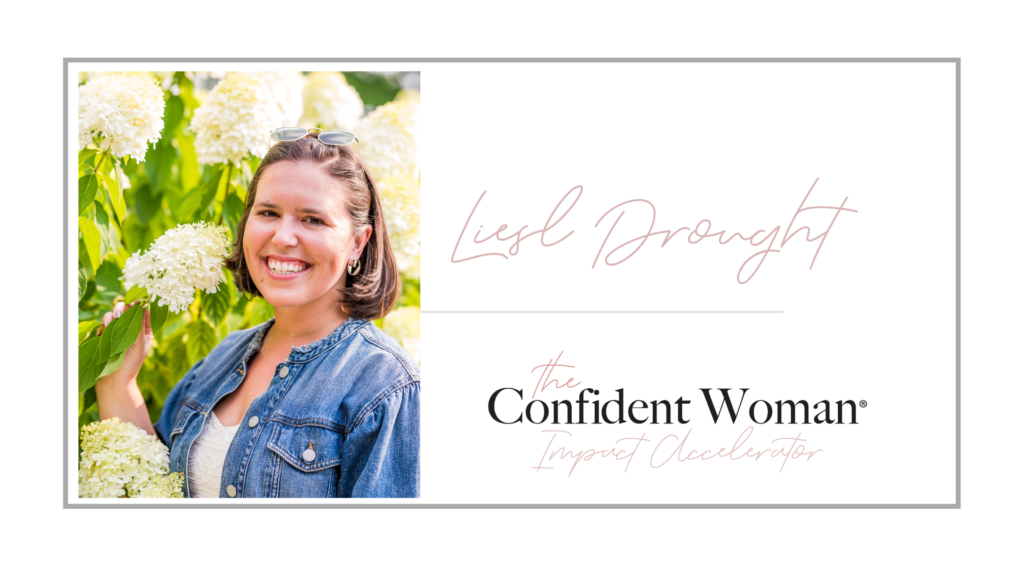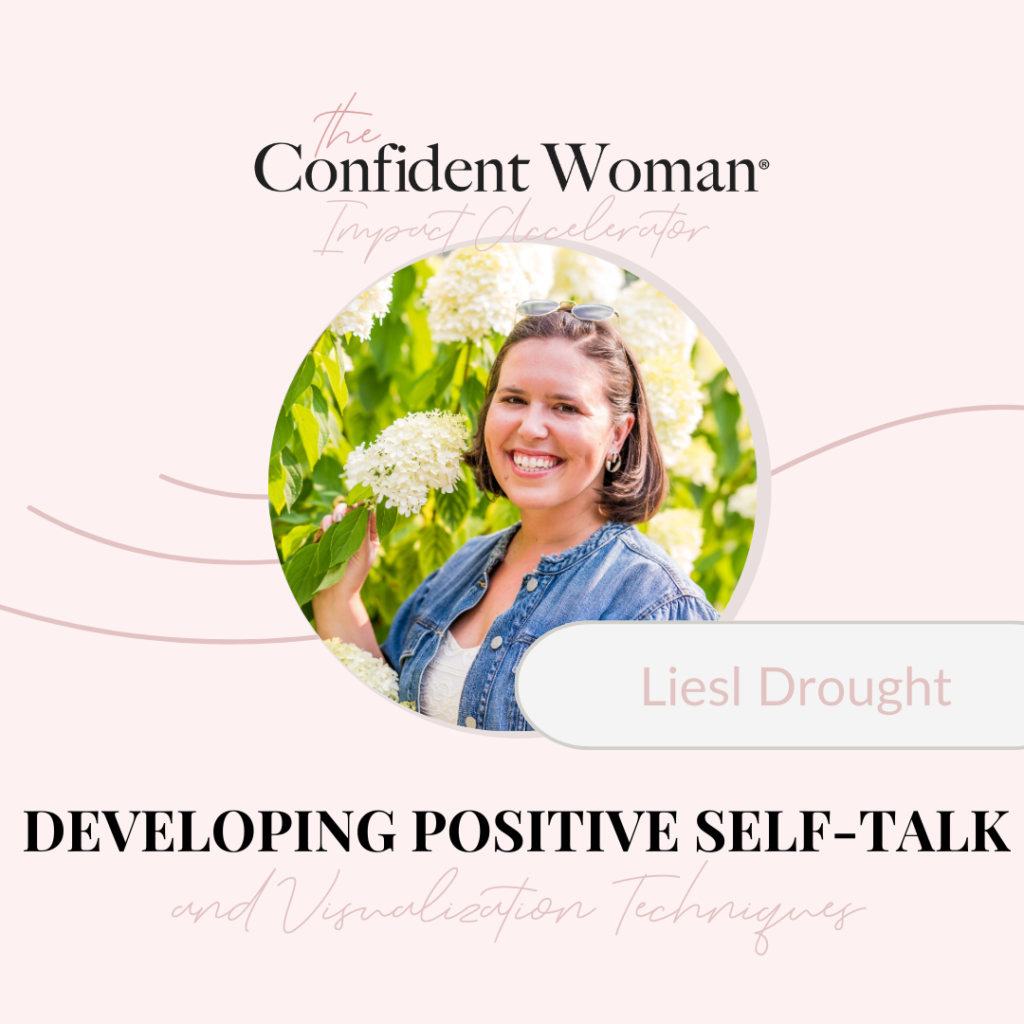Developing Positive Self-Talk and Visualization Techniques with Liesl Drought

There are times throughout our journey when the only thing that is in our way, is ourselves. That is why developing positive self-talk is so key in your journey!
Each week within The Confident Woman Impact Accelerator we’re joined by experts to talk us through a new aspect of unveiling our dream life.
In the program, we are joined by The Burnout Coach, Liesl Drought, to share her expertise on Developing Positive Self-Talk and Visualization Techniques.
Here are her thoughts:
How can women use visualization techniques to increase their chances of success and achieve their goals?
There is a lot of research out there about the power of visualization. Michael Phelps is a huge proponent of the technique and was visualizing himself on Olympic podiums well before he made it. In our session, we’ll go through a visualization together and I’ll show you the way that I love to do it. Ultimately, it boils down to envisioning yourself having what you want. Pretending you can zoom forward in the future and feel yourself accomplishing your goal. Your brain doesn’t know the difference between past, present, and future which means that when you picture it vividly in your head, it’s as if it’s actually happening in your brain. Put in as many details as you can. What does it smell like? Feel like? What is in your environment? Feel what it feels like in your body. When we do this, we’re teaching your brain that it’s safe and normal to have what you want. Visualizing it happening teaches your brain that you can handle it, you deserve it, and are capable of it. Your brain is wired to avoid change because change is scary and unknown. Visualizing what you want helps your brain feel like the change has already happened. It’s no longer scary and unknown.
How can women increase their confidence, especially when they are facing challenging situations or experiencing imposter syndrome?
The first step to increasing confidence is realizing that imposter syndrome, challenging situations and emotions, and overall not feeling confident are normal human experiences. Everyone I’ve ever met – men and women – have experienced imposter syndrome and self-doubt. It’s a normal human brain reaction. That means we don’t have to run from it.
Feeling these things usually just means that you’re reaching a new level or you’re trying something new. It doesn’t mean anything about you or your abilities. It just means your brain is freaking out a bit. Brains do that.
I like to think of your brain like a horse you’re riding. When you get close to the edge of a cliff (or what the horse thinks is a cliff – even if it’s really just a crack), the horse is going to buck. It’s going to fight you, trying to keep you safe. Usually, the techniques that our brains (the horse) use to back us up are things like self-doubt, overwhelm, imposter syndrome, and telling you that you’re not good enough or can’t do it. Those are your brain’s last-ditch efforts to try to keep you from going over the crack.
So when you’re experiencing these things, it’s actually a sign of growth. A sign that you’re getting close to what you want and your brain isn’t feeling safe so it’s trying to beat you up to get you to stay put where you are. Realizing that is always the first step.
And then to increase confidence, I like to think about confidence as a muscle you build. It’s something you practice. So I would challenge you to think about all the places you already feel confident. What makes you feel confident? Is it having your nails done, going for a blowout and having your hair look awesome? Do you feel more confident when you get good feedback at work? Do you feel more confident when you accomplish something? How can we surround you with more of that, celebrate all of that?
The goal is to help your brain feel more confident even just 1% more of the time. The more you practice that confidence muscle, the easier it gets. The more stamina you have to do bigger and bigger things. But we’ve got to start small – start with the next minimum best step.
How can women reduce fear and anxiety, and develop a more positive outlook on life?
First of all, I love to look for the positive intention of your fear and anxiety. It’s trying to protect you from something, right? What is it trying to protect against?
One of the hardest things about fear and anxiety is that society labels them as bad or wrong or something to be avoided. But when we don’t pay attention to our fear and anxiety, they’re just going to get louder. Just like a 3-year-old, they need to be heard before they’re ready to go back to playing quietly. If you don’t listen to them, they’ll just get louder.
So what is your fear and anxiety trying to tell you? Usually, your brain isn’t feeling safe. One of the easiest ways to access safety is to answer all your brain’s what-if questions. Think about the worst-case scenario. What if what you’re fearing and feeling anxious about happens? I know this feels like a counter-intuitive suggestion, but when we do this, you’re showing your brain that you could actually handle the worst-case scenario. You would figure it out, right?
When I realized the worst-case scenario of starting my own coaching private practice was that we’d have to move in with my in-laws if it failed miserably, I realized the thing that I was fearing the most wasn’t so scary. I totally didn’t want to have to move in with them, but it no longer stopped me in my tracks. I knew I could fail and not die. My brain needed that. We need to listen to the fear and anxiety but know that what they have to say isn’t necessarily the actual truth.
So once we know the worst-case scenario, we can lean into the best-case scenario too. What if it works out better than you can imagine right now? What if you succeed? What will that feel like in your body? Who will be impacted? What will your life be like? Leaning into that positive impact even 5% more can have a huge positive impact on your life. We’ll be going through a technique I use all the time to ground us into that positive outlook in our class together within the Impact Accelerator.
Craving more? Join us in the challenge here!
The Confident Woman Impact Accelerator is a program dedicated to empowering women to reach their full potential and make a positive impact on others. Through a virtual membership featuring live, weekly masterminds with industry thought leaders and weekly prompts with a guided workbook, you will emerge from the 8-week program and become the confident woman you were created to be.

Liesl Drought is the Burnout Coach. She is passionate about helping you understand the way your brain works and how that impacts your goals, lives, and careers. As a double-certified life and career coach, she has helped over 200 people in the past 4 years love the work they do without burnout. She’ll be sharing with us all about positive self-talk and visualization – two tools she uses all the time to help our brains get on board with our goals. Our brains often think that if we just beat ourselves up enough, we’ll get what we want, but it doesn’t actually work that way. Instead, we’ll be talking about what our brains actually need and how to deal with the negative when it comes up. Connect with Liesl at lieslcoaching.com


